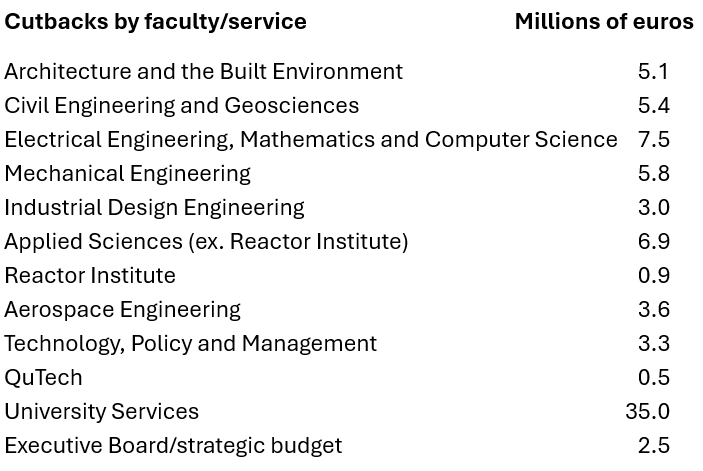TU Delft is facing serious cutbacks: up to EUR 79 million per year from 2028. The Executive Board does not rule out staff dismissals. Much will depend on the plans to economise by 10% that all faculties and services have to make in the next few months.
The faculties all have to make 10 percent cuts, which results in EEMCS having to cut the most in absolute amounts. (Photo: Marjolein van der Veldt)
The plans for the announced cutbacks are outlined in a letter that the Executive Board sent to all the faculties and services at the end of January. In it the Executive Board says that TU Delft’s financial position is coming under increasing pressure from several factors such as rising personnel costs from new legislation; increasing tangible costs from inflation; rising energy costs from geopolitical developments; and, higher property maintenance costs.
On top of this, the Executive Board wants to continue investing in strategic projects in the areas of digitalisation, expansion and real estate. At the same time, there is a threat of a further drop in the income from the Government because of new Governmental policies.
Rector Magnificus and Executive Board Chair Tim van der Hagen wrote that the measures are ‘necessary and urgent’. He says that TU Delft intends to maintain, and where possible strengthen, its position as a ‘world-class university that is at the heart of society’.
Division across faculties
The cutbacks (called ‘ombuigingen’ in Dutch or ‘reversals’) will affect all parts of TU Delft, all of which will have to reduce their costs by 10%. For a large faculty such as Electrical Engineering, Mathematics and Computer Science, this amounts to EUR 7.5 million. For smaller ones like Industrial Design Engineering, this is EUR 3 million.
University Services has to economise by EUR 35 million. Much of this – EUR 22 million – needs to be saved by hiring fewer external staff. At present, this accounts for 30% of its personnel costs.
The Executive Board has also tasked itself to cut back by 10%. This applies to its strategic budgeting. So the Executive Board will look critically at projects such as Campus Rotterdam and partnerships with Leiden and Rotterdam Universities. The real estate programme, which had already been cut back by a few hundred millions euros, will again be subject to scrutiny.
 Careful process
Careful process
TU Delft has made a detailed plan for the cost reduction process. Faculties and services are required to submit their plans to the Executive Board by 1 June 2025. These will be discussed during the summer and a decision will be taken in October 2025.
In their plans, the faculties have to clearly state which departments can be arranged more flexibly and which educational and research activities can be combined. They also have to determine which sections will be less instrumental in reaching the goals of the faculty in the future.
Effects on staffing
While the Executive Board emphasises that dismissals are ‘absolutely not the preferred option’, it does not exclude staff being affected. If forced dismissals turn out to be unavoidable, the dismissal process will be in accordance with the 2023-2025 social plan. Van der Hagen admits that the process will have ‘far reaching consequences on everyone’ and will create much uncertainty.
The cutbacks have to be rolled out from 2025 onwards and the complete package must be implemented by the end of 2027 at the latest. In 2028, TU Delft has to have a balanced budget with ‘sufficient financial space […] for necessary innovations’. Intitially, the Executive Board wanted a zero-based budget in 2026, but it is now letting that idea go to avoid the measures being ‘relatively policy neutral’ as in 2024.
In the letter Van der Hagen emphasised that the cutbacks must become a joint process in which the interests of TU Delft take precedence. ‘Leadership, collaboration and clear communication are key’, he writes.



 Careful process
Careful process
Comments are closed.